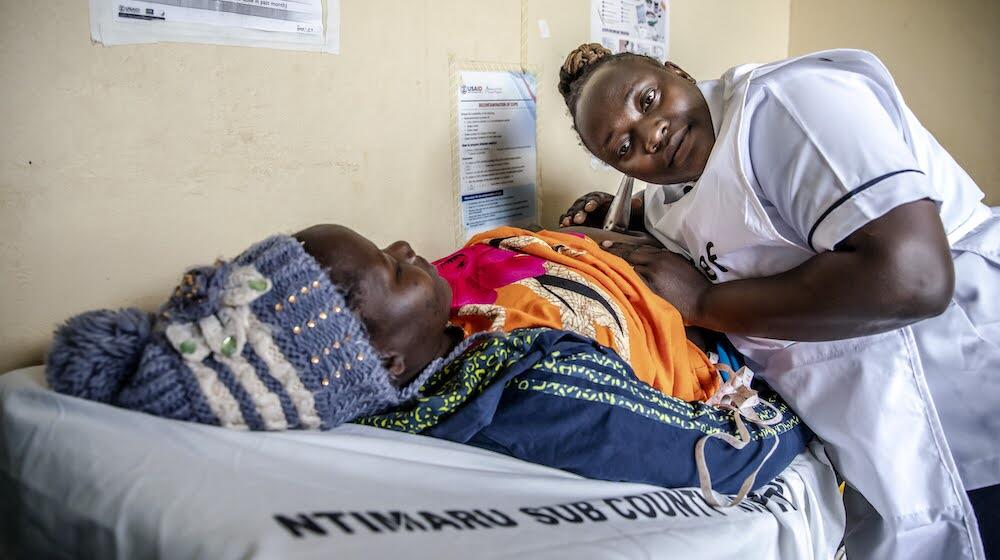More midwives needed to increase survival and health of girls, women and newborns
Johannesburg, South Africa – The number of midwives in East and Southern Africa has increased by 8 per cent since 2017, yet a shortage of almost 300,000 midwives remains. The 146,000 midwives in the region mean there are 2.5 midwives per 10,000 population – far lower than the global average of 4.4.
Nine countries in the region have a midwife density above the global average – Botswana, Comoros, Eswatini, Kenya, Lesotho, Malawi, Mauritius, Seychelles and Zimbabwe. The largest shortages are in DRC, Ethiopia, Mozambique, South Africa, Tanzania and Uganda.
Midwives are essential for ensuring that women give birth safely, to eliminate preventable deaths and injury during pregnancy and childbirth. “A capable, well-trained midwife can have an enormous impact on childbearing women and their families – an impact often passed on from one generation to the next,” said UNFPA Executive Director Dr. Natalia Kanem.
A new report by UNFPA, the United Nations sexual and reproductive health agency, entitled the State of the World’s Midwifery 2021 East and Southern Africa, calls for urgent investment in midwives to enable the achievement of Universal Health Coverage (UHC) and the Sustainable Development Goals (SDG) agenda in countries in the region.
Understanding the current state of the midwifery workforce is vital for countries to identify specific challenges, gaps and bottlenecks that need to be addressed, and suitable strategies to address them.
The global State of the World’s Midwifery report series is an unprecedented effort to document the world’s sexual, reproductive, maternal, newborn and adolescent health workforce, with a particular focus on midwives. The latest regional SoWMy report (view launch video [add link]) provides up-to-date evidence highlighting progress since the last regional midwifery workforce report produced in 2017. It includes data from all 23 countries in the UNFPA East and Southern Africa region, and projects forward to 2030.
The region has made significant progress in recent years in improving the survival and health of girls, women and newborns. Between 2000 and 2017, the region’s 23 countries achieved a maternal death reduction of 49 per cent, exceeding the global average of 38 per cent, to arrive at a regional maternal mortality ratio (MMR) of 391 deaths per 100,000 live births. Despite this improvement, the MMR remains well above the global average of 211 per 100,000.
Most countries in the region will need to accelerate their progress in order to meet national, regional and global SDG targets, the report finds. The vast majority of maternal and newborn deaths are preventable with access to a workforce with expertise in sexual and reproductive health, most commonly found in a midwife trained to global standards.
This report provides a comprehensive assessment of the current state of the region’s sexual, reproductive, maternal, newborn and adolescent health workforce. It provides clear evidence of the region’s progress and identifies bottlenecks and challenges that must be addressed.
Key findings of the report:
- East and Southern Africa has 146,000 midwives – 10,000 more midwives than in 2017, representing an 8 per cent increase.
- The region has 2.5 midwives per 10,000 population, with huge variations from country to country – e.g. 0.1 midwives per 10,000 population in Burundi, compared to 33.2 per 10,000 in Seychelles.
- Higher education and the career pathway for midwives has improved. Currently, 10 countries offer postgraduate qualifications in midwifery (Master’s and PhD levels).
- 10 countries require proof of Continuous Professional Development (CPD) for re-licensing. However, some countries do not have compulsory licensing before practicing after graduation, or they do not require CPD.
The report was developed by UNFPA in collaboration with the World Health Organization (WHO) and the International Confederation of Midwives (ICM).
About UNFPA
UNFPA is the United Nations sexual and reproductive health agency. UNFPA's mission is to deliver a world where every pregnancy is wanted, every childbirth is safe and every young person's potential is fulfilled. UNFPA calls for the realization of reproductive rights for all and supports access to a wide range of sexual and reproductive health services, including voluntary family planning, quality maternal health care and comprehensive sexuality education.
UNFPA media contact in Johannesburg:
Daisy Leoncio: leoncio@unfpa.org, +1 347 491-9154


